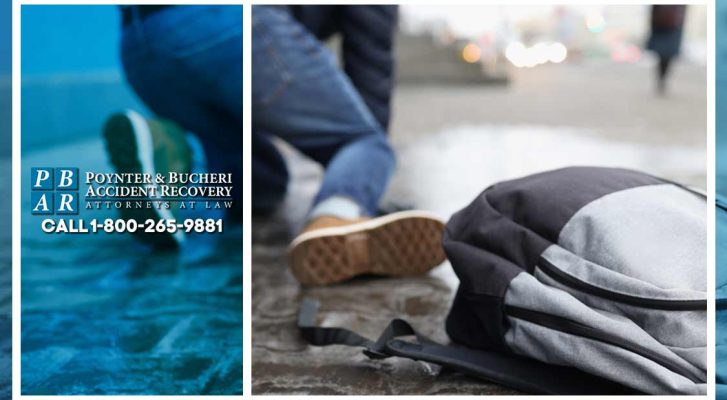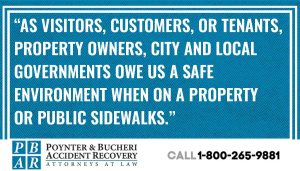
Who is Liable if you Slip and Fall on City Sidewalk?

Accidents like a slip and fall on city sidewalk can be devastating. In the United States, one in every five fall accidents results in serious injuries, and slip and fall accidents result in approximately one million emergency room visits annually. These falls can cause serious injuries or even death, and when a property owner’s negligence is to blame, you have a right to seek compensation from them or the city.
How do you know whether other parties are liable for your injury? An experienced attorney can handle your slip-and-fall case, help you determine liability after you fell on a sidewalk, prove negligence, sue the city or other responsible party, and obtain a fair settlement.
Determining Liability in a Slip and Fall on City Sidewalk
Whether you fell on a sidewalk at a business, public space, or private residence, or your injury is caused by a slip and fall on city sidewalk or other public property, the property owner of that premises can be found liable and held responsible for your injury if the city had uneven sidewalks due to neglected standard sidewalk maintenance and failed to keep their sidewalk safe for visitors.
What is Premises Liability?
Premises liability can find a property owner or city in Indiana liable if you suffered injuries when you can prove the following circumstances:
1. They owed a “duty of care” to the injured person.
2. They failed to maintain the property and prevent or address hazards.
3. These hazards directly resulted in the injuries caused.
Can I Sue Someone for a Slip and Fall on City Sidewalk?

As visitors, customers, or tenants, property owners, city and local governments owe us a safe environment when on a property or public sidewalks. If the owner or maintainer of the space does not prevent a dangerous condition, such as an uneven sidewalk or other sidewalk defect, or attend to known hazards, such as cleaning up large spills, replacing broken flooring, or removing ice from a sidewalk, then they can be found to be the liable party.
If you simply trip over your feet while distracted at the store, the property owner was not negligent and you cannot sue. However, if you were texting while walking and slipped on an unsecured extension cord or a public sidewalk, you may share some of the liability for your injury.
Depending on the state, the injured claimant and the defendant can share liability for a fall accident.
Liability Laws in Indiana
The monetary damages you may recover from a slip and fall case are based on the percentage you are found liable for your injury.
While laws vary, Indiana state’s laws have “modified comparative negligence” for personal injury cases. Both the claimant and defendant can be found liable in these accidents, but if the claimant is less than or equal to 50% responsible for the sidewalk accident, then they may still sue and recover damages and compensation after they fell. Additionally, any damages from a sidewalk slip and fall are modified to reflect the percentage of liability.
For example, let’s say you are seeking $10,000 in compensation to cover your medical bills, lost wages, and pain and suffering from the city after a slip and fall accident on a public sidewalk. Or perhaps the property owners of your apartment building never removed ice from your apartment building steps or sidewalk, resulting in a dangerous condition.
First, the jury will determine whether the defendant was negligent, such as if the property owner knew there was a hazard, failed to address the problem and it was left unchanged, and caused the incident.
Once you’ve established negligence, the jury will determine whether you share in any of the blame for the slip and fall accident. Perhaps you were on your phone at the accident scene, or you ignored a sign warning you of ice on a public sidewalk.
If the jury finds you 25% liable for the fall accident because both parties were negligent, and you were 50% or less responsible, you are entitled to damages.
Because you were found 25% liable, your compensation would be 75% of the $10,000, or $7,500.
Personal Injury Claim Pitfalls
Outside the courtroom, settlements between you and the private property owner or government entity and their insurance may also reflect the notions of comparative negligence.
The insurance company of the city will want to provide as little compensation for the incident as possible, so they will argue that you are responsible for all or part of the slip-and-fall accident.
Because of this, you must work with a qualified slip-and-fall lawyer when pursuing a personal injury lawsuit to prove your case against the city or other party. Schedule a free consultation with one as soon as possible.
Deadlines for Legal Action Against Government Agencies in Indiana
If you believe you have a case to sue the city or other municipal government entities in Indiana, state law states you must submit the claim within 180 days of the date the injury occurred. You must also submit a Notice of Tort claim to the correct department within the government agency you are suing and to the Indiana Department of Insurance Political Subdivision Risk Management Commission.

You then have to wait an additional 90 days before filing a lawsuit. During that time, government agencies may offer you a settlement. However, if you fell, don’t accept one for a personal injury lawsuit without consulting with an Indiana attorney.
What Do Defendants Owe for Slip and Fall Accidents?
The compensation for slip and fall claims depends on many factors, but Indiana doesn’t limit how much a person can recover if they sue a business, individual, or local government. Often, you can recover a settlement in a sidewalk slip case without ever going to court.
What Are Economic Damages in Fall Cases?
Economic damages are actual financial losses from your injuries from a sidewalk slip or other slip and fall case.
Those may include:
- Medical bills from medical treatment for broken bones, lacerations, or other injuries
- Lost wages or lost income
- Property damage
What Are Noneconomic Damages in Slip and Fall on City Sidewalk Cases?
Non economic damages from a sidewalk slip and fall are difficult to quantify because they are subjective, such as injury severity and the plaintiff’s quality of life before the accident.
Potential noneconomic damages may include:
- Mental anguish
- Pain and suffering
- Loss of quality of life
Poynter & Bucheri Accident Recovery—Indianapolis Personal Injury Attorneys
If you fell on a sidewalk, learn the legal options if you or a loved one has a valid slip and fall claim. The personal injury attorneys at the law offices of Poynter & Bucheri have experience with cases like yours. We can help you gather the evidence needed, such as pictures showing the dangerous condition, walk you through the legal process, prove that the government or city didn’t keep the sidewalk safe, evaluate what your accident case may be worth, and help you secure the maximum court award for your case.We will ensure that you are protected and compensated. Don’t hesitate—one of our experienced attorneys can assist you. Contact us at 1-800-265-9881 for a free consultation.
